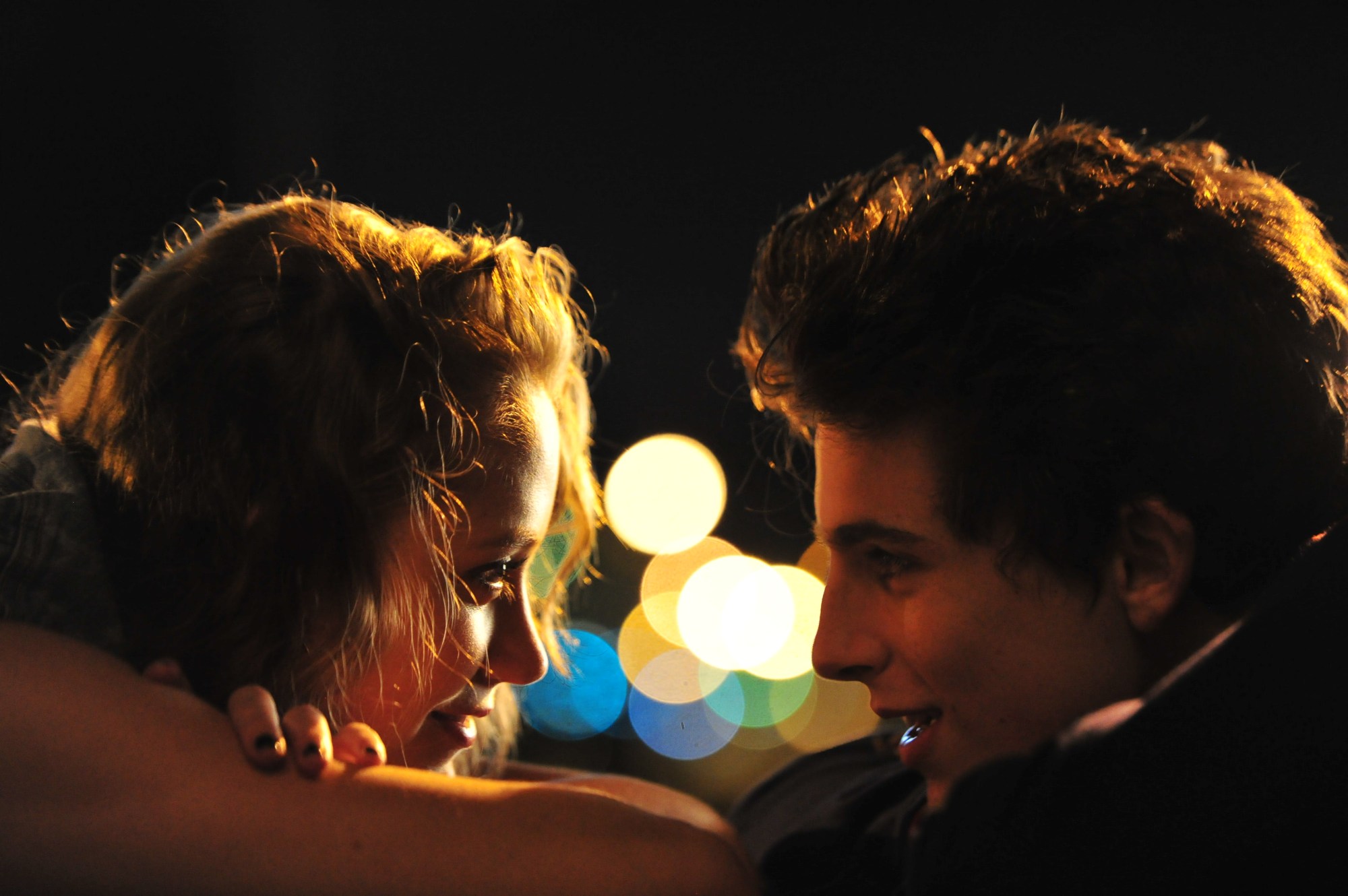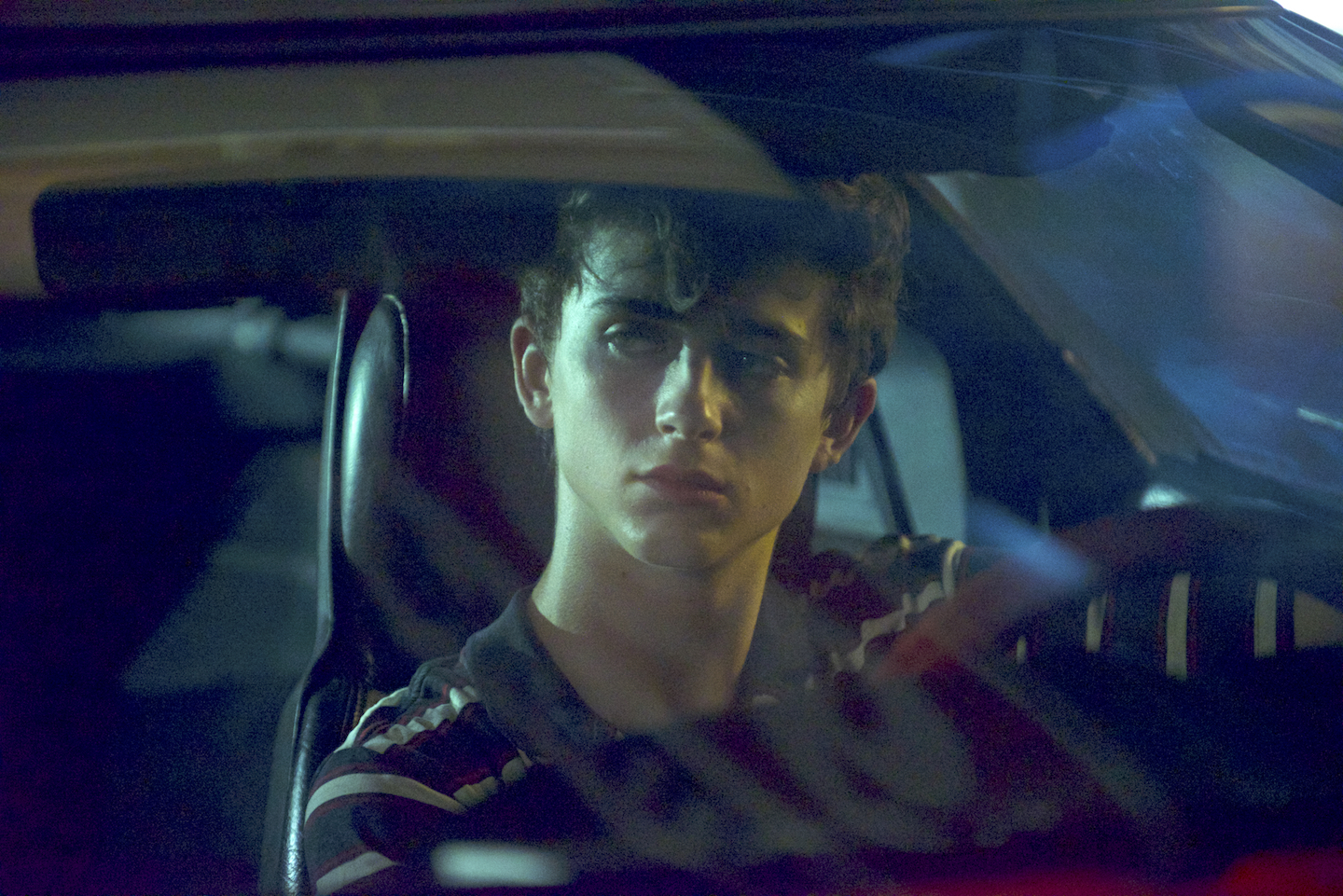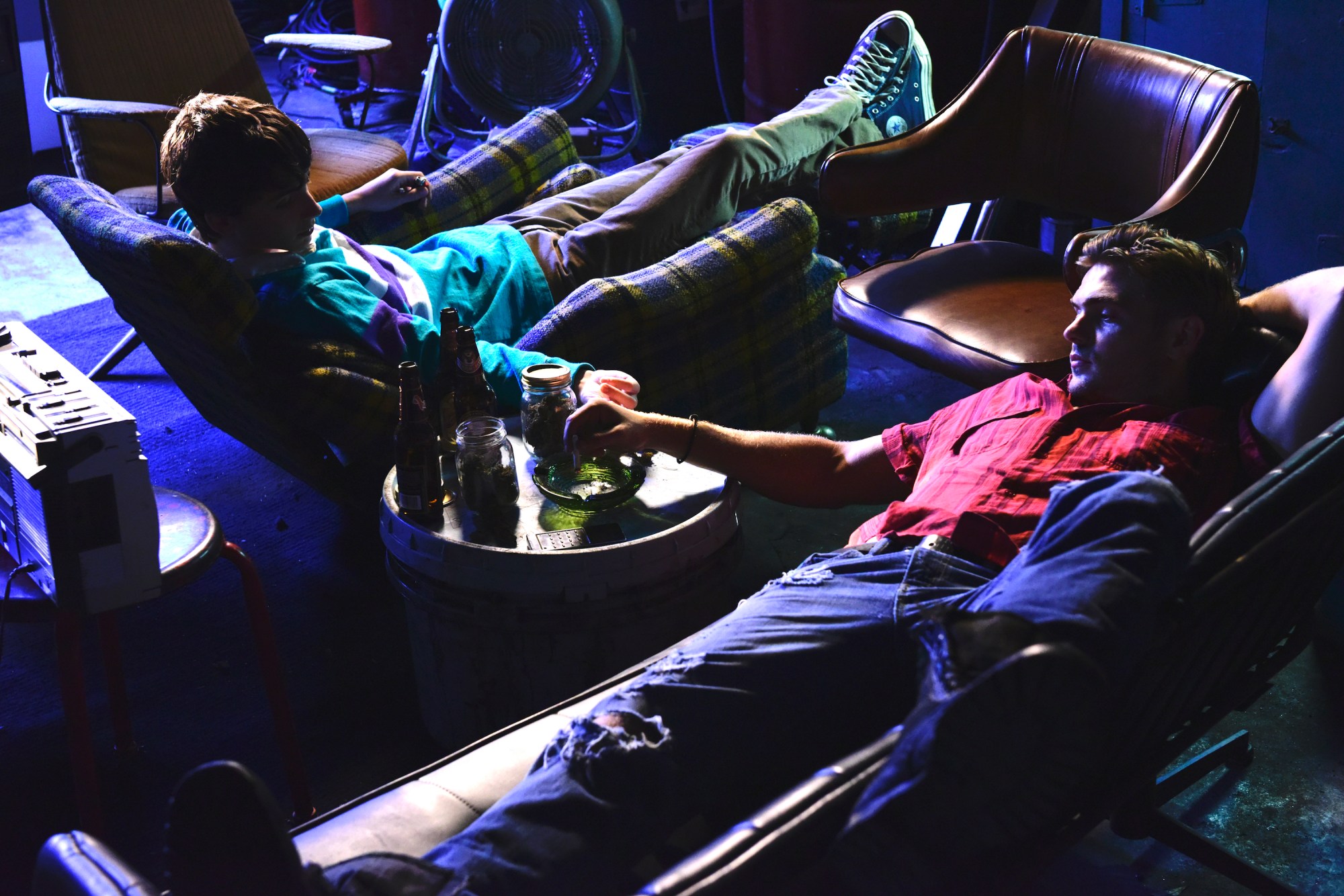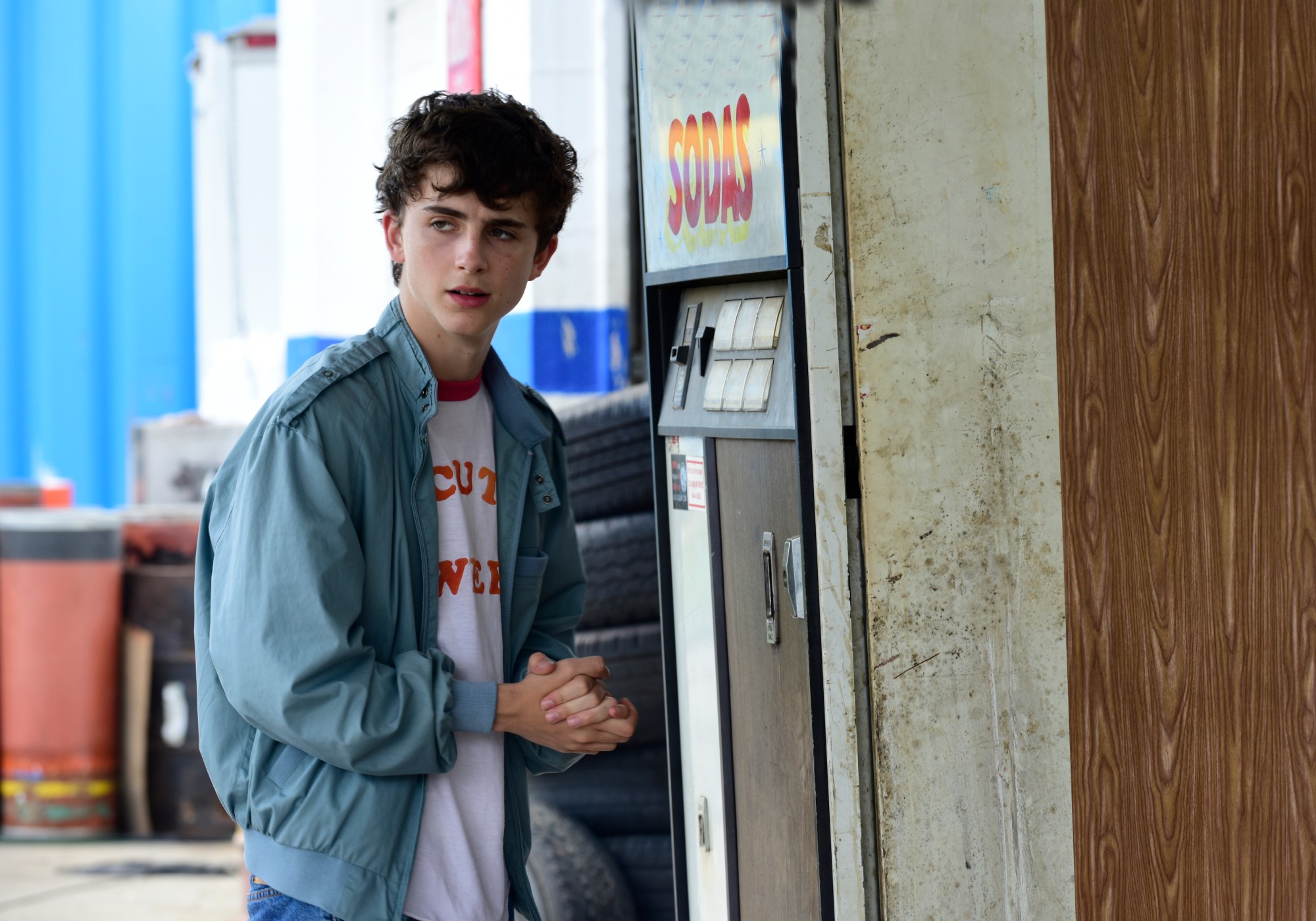Hot Summer Nights is a “mostly true” story, first-time director and writer Elijah Bynum says. A “mostly true” story involving Hurricane Bob, Cape Cod, and Timoteée Chalamet smoking lots of weed. The ambitious coming of age film is about two boys — one scrawny (Timotheé); the other brawny (Alex Roe) — going from selling weed to middle schoolers to running a vast drug empire. The story sounds like high school gossip, the kind where major facts get distorted over time. It makes sense then that the film is partly based on two boys Bynum knew through six degrees of separation in college. “The two of them left school almost overnight and vanished,” Elijah tells i-D. “Me and my friends never heard anything about them after that.” Bynum thought there was something tragic to the real-life boys’ dramatic rise and fall. So when he sat down to write a script (his second ever), Hot Summer Nights is what came out of him.
Timotheé Chalamet impresses as Daniel, the rowdy character being a far cry from the contemplative, tenderhearted Elio of Call Me By Your Name. Daniel might look like a trustworthy boy-next-door, but he has some serious sociopath vibes. For him, mastering the dark drug world has nothing to do with making money — he’s just doing it for the kicks. Bynum masterfully plays on the tropes of teen films (“Sending me away for the summer? What a cliché,” Daniel sardonically tells his mother at the start of the film) only to abruptly swerve into R-rated territory. Heads up: You will see Timothée laying face-down in his own vomit.
Here, Bynum talks to i-D about working with Timothée right before his Call Me By Your Name fame and directing his first film.

It was interesting to me how Hot Summer Nights is combines genres, seamlessly going from crime noir to 80s teen romance. How did this interesting collage come together?
At the time that I wrote the film, I was just trying to figure out how to tell the story. Because it is — or started out at least — being based on a true story about two kids I met in college who went through a similar experience as the boys in the movie. I was just trying out different forms and ways of telling the story and it just came together in the way it showed up on screen. But I don’t remember it being a conscious choice. I just remember that after experimenting with different tones and styles, this is where it landed. Any other film references that made their way in there were most likely subconscious. They are scenes that we all feel familiar with. I wanted to tell a story that felt familiar during the first two thirds, and then I wanted to end it in a way that perhaps you didn’t see coming.
Can you tell me a little more about the true events the film was inspired by?
I went to school with two kids who were a very unlikely pairing. The were the opposite of one another. One was quiet, shy, and kinda awkward — an unassuming boy-next-door. He somehow got partnered up with this swaggering alpha male. The two of them started selling a little bit of weed around the dorms. Then that spread to five of the dorms and then ten. Before you knew it, they were selling to the entire campus and other campuses in the area. It took off very quickly. And as it took off, their friendship started getting stronger. Then, of course, as the business started getting bigger you started seeing strains in their relationship. It came crashing down very quickly. So years later when I sat down to write a script — this was the second one I’ve ever written — it felt like a good old fashioned story to tell.
So, in a way, the oral narration that occurs throughout the film is from your own perspective?
A little bit. Because I saw this whole thing unfold from a few degrees of separation. I knew them, but I wasn’t terribly close to them. So I would see bits and pieces here and there and hear stories from other people who had heard stories from other people. Who knows how much of it was true. When I first started the script, I was going to tell something that I was very grounded in facts and show the gritty side of the story. But that didn’t feel as exciting to me. It felt like something that should play out as almost folklore, because that’s kind of how it played out for me.

This is your first feature film, both as a writer and a director. How was the experience?
It’s not just my first feature film I’ve directed… it’s the first thing I’ve directed period. I haven’t directed a music video or commercial or short film or anything. So you can imagine what some of the challenges were there. We had a lot of elements at play in the film: car accidents, hurricanes, it being a period piece. There were probably easier films I could of gone out and tried to make as my first one. It was intense, but I think what carried everyone through was that we were excited about the material and were excited to make a movie. There was that nervous energy on set of, ‘Are we even going to make it through this day?’ I think it shows up on screen in the best way possible.
How did you go about creating a film that’s set in 1991?
I knew I wanted it to take place in the past, so that the film felt like a hazy dream. I didn’t want it to feel terribly grounded, but like a story that has been passed down and facts have changed. At the time I wrote it, there wasn’t the 80s/early-90s craze that there is now. Stranger Things and It Follows were not around.
You were ahead of the curve!
Well, I thought I was at the time. The joke is on me now. It felt like a really groovy period to tap into. Then, doing some research, I found this devastating hurricane that hit Cape Cod in 1991. It just felt like ‘There it is, that’s when the film should take place.’

And how did the fashion of the film come together? One of my favorite pieces is when Timothée is wearing the Jessie Jackson campaign hat.
I had pulled together a number of references for our costume designer. We didn’t want it to feel like we were pointing our fingers and making fun of the period or like it was a costume party. We wanted to make it feel grounded, and almost timeless. So we could have probably leaned even further into some of the absurdity of the hair and clothes from that period, but we didn’t want it to be too much of a distraction. Even some of the music in the film is not grounded in 1991. It just feels like some collective past — a distant memory.
The Jessie Jackson hat actually came up last minute. Timmy’s hair had grown in a little longer and it wasn’t matching the previous scene, so we had to throw a hat on his head. We had looked at some generic hats and I thought it’d be a fun idea to throw the Jessie Jackson hat on him.
Hot Summer Nights was filmed before Timothée starred in Call Me By Your Name . What was like to work with him right when he was on the precipice of something really big?
No one could have seen this coming, that’s for sure. When I had met Timothée, he had done a few indie films, a season on Homeland, and a small part in Interstellar (which was his biggest role yet at the time). We had tapped him because we thought he was a fantastic actor for the role. Watching what’s happened over the last year has been incredible. I think everyone involved in the film is benefiting from this and I hope a lot more people check out the movie now that Timmy’s got such a big name.
You actually filmed Hot Summer Nights two years ago. Was it frustrating or great that the film came out so long after it was filmed?
To be honest with you, a little bit of both. I wouldn’t say it was frustrating, just that there were times I was a little bit restless because we had finished the movie and there was a waiting period. But during that waiting period, Timothée had become a big-time actor and, in hindsight, that was the best thing for the movie. Now it’s positioned in a way that, if it had come out a year ago, it would not have had so much attention on it and I don’t think people would have been as excited about it. So, ultimately, it was a good thing.

